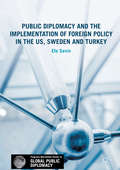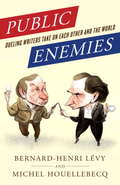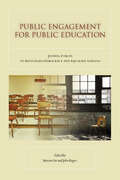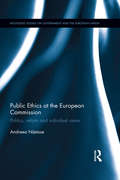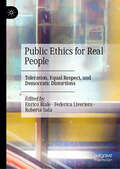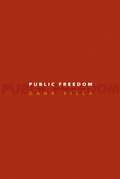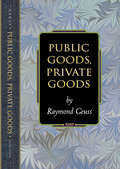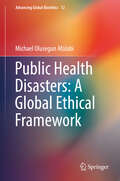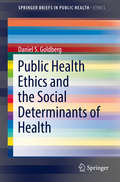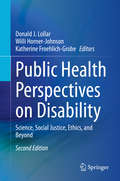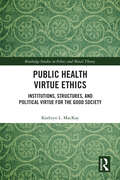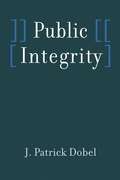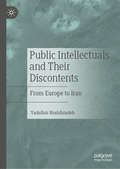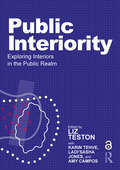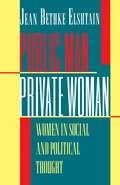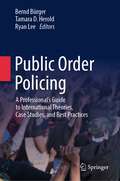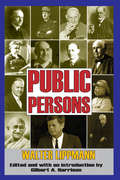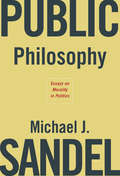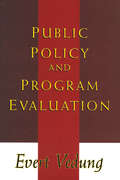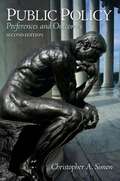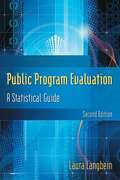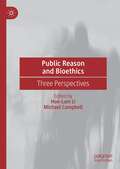- Table View
- List View
Public Diplomacy and the Implementation of Foreign Policy in the US, Sweden and Turkey (Palgrave Macmillan Series in Global Public Diplomacy)
by Efe SevinThis book presents a comprehensive framework, six pathways of connection, which explains the impact of public diplomacy on achieving foreign policy goals. The comparative study of three important public diplomacy practitioners with distinctive challenges and approaches shows the necessity to move beyond soft power to appreciate the role of public diplomacy in global politics. Through theoretical discussions and case studies, six pathways of connection is presented as a framework to design new public diplomacy projects and measure their impact on foreign policy.
Public Enemies: Dueling Writers Take On Each Other and the World
by Bernard-Henri Lévy Michel HouellebecqTwo brilliant, controversial authors confront each other and their enemies in an unforgettable exchange of letters. In one corner, Bernard-Henri Lévy, creator of the classic Barbarism with a Human Face, dismissed by the media as a wealthy, self-promoting, arrogant do-gooder. In the other, Michel Houellebecq, bestselling author of The Elementary Particles, widely derided as a sex-obsessed racist and misogynist. What began as a secret correspondence between bitter enemies evolved into a remarkable joint personal meditation by France's premier literary and political live wires. An instant international bestseller, Public Enemies has now been translated into English for all lovers of superb insights, scandalous opinions, and iconoclastic ideas. In wicked, wide-ranging, and freewheeling letters, the two self-described "whipping boys" debate whether they crave disgrace or secretly have an insane desire to please. Lévy extols heroism in the face of tyranny; Houellebecq sees himself as one who would fight little and badly. Lévy says "life does not live" unless he can write; Houellebecq bemoans work as leaving him in such "a state of nervous exhaustion that it takes several bottles of alcohol to get out." There are also touching and intimate exchanges on the existence of God and about their own families. Dazzling, delightful, and provocative, Public Enemies is a death match between literary lions, remarkable men who find common ground, confident that, in the end (as Lévy puts it), "it is we who will come out on top."
Public Engagement for Public Education: Joining Forces to Revitalize Democracy and Equalize Schools
by John Rogers Marion OrrCommunity participation plays a large role in the success or failure of our public schools. This book focuses attention on the problem of inequality in public engagement, considering how race, class, ethnicity, language, and immigration status shape opportunities for engagement. Without the active participation of the public, chances for improving school systems are limited. Without equal opportunity for public engagement, those in the lower reaches of stratified society are left largely on the outside looking in-and that all too easily becomes a self-perpetuating cycle. Public Engagement for Public Educationspeaks to the potential for students, parents, community members, and civic leaders to join forces and create more equitable schooling. Such engagement can expand access to quality educational pathways which in turn paves the way to a stronger voice in society and the promise of the American dream. If segments of society are blocked access to those pathways, the book argues, nothing less than the health of American democracy is at stake.
Public Ethics at the European Commission: Politics, Reform and Individual Views (Routledge Studies on Government and the European Union)
by Andreea NastaseSince the early 2000s, reforms in the area of public ethics have represented a significant part in the European Commission's efforts to improve its internal governance and democratic legitimacy, and address the crisis of public confidence in European integration. This book comprises a study of ethics and public integrity issues in the administrative services of the European Commission. The author traces the reforms implemented in this area since the early 2000s, and asks whether and how they have shaped Commission officials’ thinking about appropriate behaviour in public office. Based on in-depth interviews and the use of vignettes, the book reveals that the influence of ethics regulations is subtle and full of contradictions: while a heightened awareness and discussion of ethical issues exists in the Commission nowadays, the topic is nonetheless often considered as a matter of "common sense". This book breaks new ground as the first analysis of ethics at the level of individual EU officials. It advances a new angle to the study of the Commission as an administrative actor, and sheds light on an important but under-researched component of its efforts to address criticism concerning democratic legitimacy. In the field of administrative ethics, the book tackles research gaps regarding the practice and impact of ethics policies within public organizations. This text will be of key interest to scholars, students and practitioners of EU Studies/Politics, institutional reform, administrative ethics, and more broadly European governance and public policy.
Public Ethics for Real People: Toleration, Equal Respect, and Democratic Distortions
by Federica Liveriero Enrico Biale Roberta SalaThis book develops an innovative paradigm of public ethics that provides a unique insight into three central themes – recognition, social conflicts and democratic distortions – while critically celebrating the work of Anna Elisabetta Galeotti. In honor of her seventieth birthday, this edited collection brings together leading scholars in the field of normative political philosophy to reason upon the main strands of her research. The volume envisages a general paradigm of public ethics to deal with social conflicts that involve structural dynamics and deliberative deficits. While addressing diverse yet interrelated topics, all the contributors demonstrate a commitment to the ideal that, in the construction and reform of social and political institutions, respect for individuals as the makers of their own lives should act as the guiding principle. Against this backdrop, this volume strikes a difficult-to-reach balance between refined theorizing over classical themes of the liberal tradition and the ability to open these classic themes to new strands of research. The collection deals with crucial contemporary challenges to the democratic order, such as democratic backsliding and the breach of social trust, legal and democratic fights over free speech, multicultural clashes in highly diverse societies, and reparation for historical wrongs.
Public Forgetting: The Rhetoric and Politics of Beginning Again (G - Reference, Information and Interdisciplinary Subjects)
by Bradford VivianForgetting is usually juxtaposed with memory as its opposite in a negative way: it is seen as the loss of the ability to remember, or, ironically, as the inevitable process of distortion or dissolution that accompanies attempts to commemorate the past. The civic emphasis on the crucial importance of preserving lessons from the past to prevent us from repeating mistakes that led to violence and injustice, invoked most poignantly in the call of “Never again” from Holocaust survivors, tends to promote a view of forgetting as verging on sin or irresponsibility. In this book, Bradford Vivian hopes to put a much more positive spin on forgetting by elucidating its constitutive role in the formation and transformation of public memory. Using examples ranging from classical rhetoric to contemporary crises like 9/11, Public Forgetting demonstrates how, contrary to conventional wisdom, communities may adopt idioms of forgetting in order to create new and beneficial standards of public judgment concerning the lessons and responsibilities of their shared past.
Public Freedom
by Dana VillaThe freedom to take part in civic life--whether in the exercise of one's right to vote or congregate and protest--has become increasingly less important to Americans than individual rights and liberties. In Public Freedom, renowned political theorist Dana Villa argues that political freedom is essential to both the preservation of constitutional government and the very substance of American democracy itself. Through intense close readings of theorists such as Hegel, Tocqueville, Mill, Adorno, Arendt, and Foucault, Villa diagnoses the key causes of our democratic discontent and offers solutions to preserve at least some of our democratic hopes. He demonstrates how Americans' preoccupation with a market-based conception of freedom--that is, the personal freedom to choose among different material, moral, and vocational goods--has led to the gradual erosion of meaningful public participation in politics as well as diminished interest in the health of the public realm itself. Villa critically examines, among other topics, the promise and limits of civil society and associational life as sources of democratic renewal; the effects of mass media on the public arena; and the problematic but still necessary ideas of civic competence and democratic maturity. Public Freedom is a passionate and insightful defense of political liberties at a moment in America's history when such freedoms are very much at risk.
Public Goods, Private Goods (Princeton Monographs in Philosophy #11)
by Raymond GeussMuch political thinking today, particularly that influenced by liberalism, assumes a clear distinction between the public and the private, and holds that the correct understanding of this should weigh heavily in our attitude to human goods. It is, for instance, widely held that the state may address human action in the ''public'' realm but not in the ''private.'' In Public Goods, Private Goods Raymond Geuss exposes the profound flaws of such thinking and calls for a more nuanced approach. Drawing on a series of colorful examples from the ancient world, he illustrates some of the many ways in which actions can in fact be understood as public or private. The first chapter discusses Diogenes the Cynic, who flouted conventions about what should be public and what should be private by, among other things, masturbating in the Athenian marketplace. Next comes an analysis of Julius Caesar's decision to defy the Senate by crossing the Rubicon with his army; in doing so, Caesar asserted his dignity as a private person while acting in a public capacity. The third chapter considers St. Augustine's retreat from public life to contemplate his own, private spiritual condition. In the fourth, Geuss goes on to examine recent liberal views, questioning, in particular, common assumptions about the importance of public dialogue and the purportedly unlimited possibilities humans have for reaching consensus. He suggests that the liberal concern to maintain and protect, even at a very high cost, an inviolable ''private sphere'' for each individual is confused. Geuss concludes that a view of politics and morality derived from Hobbes and Nietzsche is a more realistic and enlightening way than modern liberalism to think about human goods. Ultimately, he cautions, a simplistic understanding of privacy leads to simplistic ideas about what the state is and is not justified in doing.
Public Health Disasters: A Global Ethical Framework (Advancing Global Bioethics #12)
by Michael Olusegun AfolabiThis book presents the first critical examination of the overlapping ethical, sociocultural, and policy-related issues surrounding disasters, global bioethics, and public health ethics. These issues are elucidated under the conceptual rubric: Public health disasters (PHDs). The book defines PHDs as public health issues with devastating social consequences, the attendant public health impacts of natural or man-made disasters, and latent or low prevalence public health issues with the potential to rapidly acquire pandemic capacities. This notion is illustrated using Ebola and pandemic influenza outbreaks, atypical drug-resistant tuberculosis, and the health emergencies of earthquakes as focal points. Drawing on an approach that reckons with microbial, existential, and anthropological realities; the book develops a relational-based global ethical framework that can help address the local, anthropological, ecological, and transnational dynamics of the ethical issues engendered by public health disasters. The book also charts some of the critical roles that relevant local and transnational stakeholders may play in translating the proposed global ethical framework from the sphere of concept to the arena of action. This title is of immense benefit to bioethics scholars, public and global health policy experts, as well as graduate students working in the area of global health, public health ethics, and disaster bioethics.
Public Health Ethics
by Stephen HollandThe study of public health aims to protect and promote the wellbeing of the public as well as reduce health inequalities. Public health ethics asks how far we should go to achieve these goals, balancing the rights and needs of individuals against those of the community. But what are these and how much weight should be given to each of them? In the third edition of his well-loved textbook, Stephen Holland shows how philosophy is key to evaluating the suitability of public health interventions. Holland explores the key goals of public health ethics in relation to both moral and political philosophy, reflecting on our everyday intuitions about which public health policies are justified. In light of recent developments, he includes new content exploring equity and health inequalities, and on how public health information is gathered and used. The book is updated throughout with material on contemporary cases, such as the COVID-19 pandemic. Public Health Ethics continues to provide a lively, accessible and philosophically informed introduction. As well as being an ideal student text, Holland&’s systematic discussion will engage the more advanced reader and inform scholarship in the field.
Public Health Ethics and the Social Determinants of Health (SpringerBriefs in Public Health)
by Daniel S. GoldbergThis progressive resource places concepts of social determinants of health in the larger contexts of contemporary health ethics and the evolution of social reform. It provides needed analysis of the larger causes behind the immediate causes of illness and epidemics, particularly injustice, systemic inequities, and the cumulative effect of compound disadvantages. This moral approach to collective and individual responsibilities—on the part of practitioners as well as the public—supports a sound blueprint for finding answers to longstanding global and local concerns. Readers are challenged to recognize the critical role of social determinants to their perception of health issues, controversies, and possibilities as the book:· Details the epidemiologic evidence regarding social determinants of health. · Key ethical implications of the evidence regarding social determinants of health. · Considers the role of risky health behaviors in determining population health outcomes. · Addresses ethical questions of priority-setting at the policy and practice levels. · Translates social determinants of health into health policy goals. Half textbook, half monograph, Public Health Ethics and the Social Determinants of Health Is geared toward students in MPH programs as well as public health professionals in diverse contexts such as local health departments and non-profit organizations. It informs public health scientists and scholars, and can also serve as an introductory text for students in public health ethics, or as part of a general applied ethics course.
Public Health Perspectives on Disability: Science, Social Justice, Ethics, and Beyond
by Donald J. Lollar Willi Horner-Johnson Katherine Froehlich-GrobeIn this new edition, the editors and contributors update and expand on the educational framework that was introduced in the first edition for rethinking disability in public health study and practice and for attaining the competencies that should accompany this knowledge. The second edition highlights key areas of research that have emerged since the first edition was published. This edition includes new and updated chapters that have particular relevance for public health practice: Disability, Intersectionality, and Inequity: Life in the MarginsDisability and Health Programs: Emerging PartnersChildren with Special Healthcare NeedsDisasters and Disability: Rhetoric and RealityInter-relationship of Health Insurance and Employment for People with DisabilitiesPublic Health, Work, and DisabilityActions to Prepare a Competent Workforce Public Health Perspectives on Disability: Science, Social Justice, Ethics, and Beyond, 2nd Edition, is an essential resource for public health educators and practitioners as well as students in graduate schools of public health throughout the United States.
Public Health Virtue Ethics: Institutions, Structures, and Political Virtue for the Good Society (Routledge Studies in Ethics and Moral Theory)
by Kathryn L. MacKayThis book argues that virtue ethics should be incorporated into public health ethics. It provides the theoretical foundations for a virtue ethics that is applicable to public health, as well as political institutions more broadly.Ethical analyses of public health policies and practices have been mostly conducted in terms of examining the best consequences or weighing outcomes against liberty, autonomy, justice, and harm. While these debates are important, analyses conducted only in these terms leave a huge range of moral issues under-examined. This book contends that a virtue ethics developed for political institutions such as public health provides the tools for a more robust moral analysis of institutional structures, actions, and responsibilities. First, it presents theoretical arguments for political virtues, explaining how institutions like public health have moral agency and how these institutional agents can, in turn, have (or lack) virtues. It then presents three political virtues that are particularly relevant to public health: justice, civic friendship, and epistemic humility. Each of these virtues is important to what it means for public health to do its work excellently, and each sheds light upon the moral justifiability of past or current public health practice.Public Health Virtue Ethics will appeal to researchers and graduate students working in virtue ethics, bioethics, and public health ethics.
Public Integrity
by J. Patrick DobelIn this groundbreaking book, J. Patrick Dobel describes and analyzes the elements that constitute integrity in public office. Drawing on case studies, memoirs, interviews, and fiction (e. g. , John Le Carré), Dobel addresses such issues as when to resign and when to stay in office. He examines the temptations of power, the relation between private and public life, and the role of honor and prudence in making personal decisions. He applies not only moral theory but also the insights of history, organizational theory, and psychology. Unlike most political ethics books, Public Integrity puts personal responsibility at the center of public morality, examining not just the responsibilities of office but also the role of personal moral commitments and promises. This timely book reminds us of the importance of public integrity as well as the demands and challenges that often threaten that integrity, especially in a liberal democracy such as the United States.
Public Intellectuals and Their Discontents: From Europe to Iran
by Yadullah ShahibzadehThis book addresses the ways in which the figure of the intellectuals and their relationship to the public has been theorized through the conceptualizations of bureaucracy, democracy, and communism as universal processes from the 19th century to the present. Starting with Hegel and Marx, the author looks at the rise of the figure of the universal intellectual in various forms, before turning to what is presented as a transformation of the figure of the intellectual into ‘the public intellectual’ advanced by the New Philosophies and the critical response offered by Edward Said. The study presents two comparative case studies: the Iranian Revolution and the public intellectuals in Europe, specifically in Norway, before concluding with a focus on the decay of the figure of the intellectuals and highlighting Ranciere’s critique of the intellectual/masses distinction.
Public Interiority: Exploring Interiors in the Public Realm
by Amy Campos Karin Tehve Liz Teston Ladi'Sasha JonesPublic Interiority reconsiders the limits of the interior and its perceived spaces, exploring the notion that interior conditions can exist within an exterior environment, and therefore challenging the very foundations of the interior architecture field.Public Interiority contains eight chapters and 16 visual essays that document the historical, material, and social conditions in contemporary cities, reconsidering the limits of the interior, resiliency in design, spatial perception, and territories within curated urban exteriors. Topics include the supergraphics of Black Lives Matter protests, privacy and US Supreme Court landmark cases, Instagram as a quasi-public interior, domestic simulation in Victorian curative environments, the micro-urban commons of public transit, and the timely study uncovering Jean-Michel Wilmotte’s approach to "urban interior designing," among many others.Including scholarly and visual essays by experts from a range of disciplines, including architecture, interior architecture, landscape architecture, exhibition design, craft and the visual arts, and design history and theory, this volume will be a helpful resource for all those upper-level students and scholars working in these related fields.The Open Access version of this book, available at http://www.taylorfrancis.com, has been made available under a Creative Commons Attribution-Non Commercial-No Derivatives (CC-BY-NC-ND) 4.0 license.
Public Man, Private Woman: Women in Social and Political Thought - Second Edition
by Jean Bethke ElshtainFocusing on the Western philosophical tradition and the work of contemporary feminists, Jean Elshtain explores the general tendency to assert the primacy of the public world—the political sphere dominated by men—and to denigrate the private world—the familial sphere dominated by women. She offers her own positive reconstruction of the public and the private in a feminist theory that reaffirms the importance of the family and envisions an "ethical polity."
Public Order Policing: A Professional's Guide to International Theories, Case Studies, and Best Practices
by Ryan Lee Bernd Bürger Tamara D. HeroldSuccessful public order management is critical to upholding democracy and maintaining the rule of law. Negative police-public interactions during assemblies can impact the safety and well-being of citizens and officers, as well as local and international perceptions of police legitimacy. As observed during events across the world, including assemblies in the U.S., Myanmar, Belarus, Russia, and elsewhere, police mismanagement of mass demonstrations often instigates crowd violence and other harmful behaviors. The causes of violence at assemblies are complex and multi-faceted. Failure to understand crowd dynamics that lead to violence limits police effectiveness and contributes to poor officer decision-making. This book offers an international review of public order management experiences and effective practices. Practical examples, grounded in multi-disciplinary theory and science, offer a roadmap to improve police response and increase safety at assemblies in democratic countries. The diverse content, perspectives, and lessons learned presented in this volume will serve as a useful guide for all people working in the field of public order management, including police officials, policymakers, and researchers. This edited volume was written by and for practitioners, pracademics, and academics to review the complex and demanding task of policing public order.
Public Persons
by Walter LippmannThis set of brief pieces examines the relation of power to knowledge. Lippmann paid little homage to the innate wisdom of the people. While he had no wish to disenfranchise citizens, he believed elites drove the engines of power. His point was that liberty and democracy require government that will, when necessary, "swim against the tides of private feelings." Because the public is too divided, poorly informed, and too self-regarding, authority has to be delegated, perhaps to "intelligence bureaus," or at least to those who are wiser than the many that have the power to decide vexing questions on their own merits.Lippmann knew that in the real world we cannot expect to be ruled by philosopher-kings. While ready to settle for less, he was not ready to settle for politicians who get ahead "only as they placate, appease, bribe, seduce, bamboozle and otherwise manage to manipulate demanding and threatening elements in their constituencies." The seducers and bamboozlers were generally in charge, and because they were in an age "rich with varied and generous passions" they had become disorderly and deranged.Public Persons is the informal side of The Public Philosophy. Lippmann tries to account for the decline of Western democracies and prescribe for their revival. He concludes that it is not possible to discover by rational inquiry the conditions that must be met if there is to be a good society. Lippmann saw tension between private impulses and transcendent truth as the "inexhaustible theme of human discourse." The occasional harmonies in the lives of saints and the deeds of heroes and the excellence of genius are glorious. But glory was the exception, wretchedness the rule. In this casual volume both are given a human face.
Public Philosophy: Essays on Morality in Politics
by Michael J. SandelIn this book, Michael Sandel takes up some of the hotly contested moral and political issues of our time, including affirmative action, assisted suicide, abortion, gay rights, stem cell research, the meaning of toleration and civility, the gap between rich and poor, the role of markets, and the place of religion in public life. He argues that the most prominent ideals in our political life--individual rights and freedom of choice--do not by themselves provide an adequate ethic for a democratic society. Sandel calls for a politics that gives greater emphasis to citizenship, community, and civic virtue, and that grapples more directly with questions of the good life. Liberals often worry that inviting moral and religious argument into the public sphere runs the risk of intolerance and coercion. These essays respond to that concern by showing that substantive moral discourse is not at odds with progressive public purposes, and that a pluralist society need not shrink from engaging the moral and religious convictions that its citizens bring to public life.
Public Policy and Program Evaluation (Public Policy And Program Evaluation Ser.)
by Evert VedungEvaluation is a controversial and little-understood strategy of public governance, control, and decision making. As early as classical antiquity, scholars were summoned to court to counsel kings. Public policy and program evaluation is a recent addition to the great chain of attempts to use the brainpower of scholars and scientists to further the interests of the state. Evaluation scholars are asked to provide retrospective assessments of the implementation, output, and outcome of government measures in order to effect deeper understanding and well-grounded decisions on the part of those in charge of government operations. Evaluation is the process of distinguishing the worthwhile from the worthless, the precious from the useless; evaluation implies looking backward in order to be able to steer forward better.Written from a political science perspective, Public Policy and Program Evaluation provides an overview of the possibilities and limits of public sector evaluation. Evert Vedung examines evaluation as a mechanism for monitoring, systematizing, and grading government activities and their results so that public officials, in their future-oriented work, will be able to act as responsibly, creatively, and efficiently as possible. Topics discussed include: "Evaluation, Rationality, and Theories of Public Management"; "Models of Evaluation"; "Internal or External Evaluation"; "Impact Assessment as Tryout and Social Experimentation"; "Process Evaluation and Implementation Theory"; "The Eight-Problems Approach to Evaluation"; and "Uses and Users of Evaluation."All evaluation rests upon the idea that perceptions, opinions, intentions, judgments—in short, everything concerned with the world of human consciousness—play such interesting roles in political and administrative action that their functions are worth investigating. Through experience, humans may learn from past actions. The interventions of the modern state are so extensive, their execu
Public Policy: Preferences and Outcomes (Second Edition)
by Christopher A. SimonBy combining normative and empirical perspectives, Christopher A. Simon's second edition of Public Policy encourages the next generation to of policy makers to think both practically and philosophically throughout the policy process. This second and heavily revised edition covers the historic background, political science, and philosophical values of public policy. Chapters conclude with a case study, engaging students in applying their theoretical knowledge in practical terms, and encouraging them to be informed and active citizens.
Public Program Evaluation: A Statistical Guide
by Laura LangbeinThis readable and comprehensive text is designed to equip students and practitioners with the statistical skills needed to meet government standards regarding public program evaluation. Even those with little statistical training will find the explanations clear, with many illustrative examples, case studies, and applications. Far more than a cookbook of statistical techniques, the book begins with chapters on the overall context for successful program evaluations, and carefully explains statistical methods--and threats to internal and statistical validity--that correspond to each evaluation design. Laura Langbein then presents a variety of methods for program analysis, and advise readers on how to select the mix of methods most appropriate for the issues they deal with-- always balancing methodology with the need for generality, the size of the evaluator's budget, the availability of data, and the need for quick results.
Public Reason Confucianism
by Sungmoon KimRecent proposals concerning Confucian meritocratic perfectionism have justified Confucian perfectionism in terms of political meritocracy. In contrast, 'Confucian democratic perfectionism' is a form of comprehensive Confucian perfectionism that can accommodate a plurality of values in civil society. It is also fully compatible with core values of democracy such as popular sovereignty, political equality, and the right to political participation. Sungmoon Kim presents 'public reason Confucianism' as the most attractive option for contemporary East Asian societies that are historically and culturally Confucian. Public reason Confucianism is a particular style of Confucian democratic perfectionism in which comprehensive Confucianism is connected with perfectionism via a distinctive form of public reason. It calls for an active role for the democratic state in promoting a Confucian conception of the good life, at the heart of which are such core Confucian values as filial piety and ritual propriety.
Public Reason and Bioethics: Three Perspectives
by Michael Campbell Hon-Lam LiThis book explores and elaborates three theories of public reason, drawn from Rawlsian political liberalism, natural law theory, and Confucianism. Drawing together academics from these separate approaches, the volume explores how the three theories critique each other, as well as how each one brings its theoretical arsenal to bear on the urgent contemporary debate of medical assistance in dying. The volume is structured in two parts: an exploration of the three traditions, followed by an in-depth overview of the conceptual and historical background. In Part I, the three comprehensive opening chapters are supplemented by six dynamic chapters in dialogue with each other, each author responding to the other two traditions, and subsequently reflecting on the possible deficiencies of their own theories. The chapters in Part II cover a broad range of subjects, from an overview of the history of bioethics to the nature of autonomy and its status as a moral and political value. In its entirety, the volume provides a vibrant and exemplary collaborative resource to scholars interested in the role of public reason and its relevance in bioethical debate.
